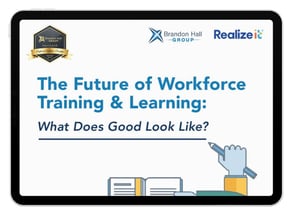The question is being asked in organizations everywhere – what does good look like when it comes to our company’s training and learning capabilities? In a corporate world that has been greatly disrupted by the global pandemic for close to two years, demands on the learning and development function have never been higher. And most organizations are still playing catch-up as learning has not been strongly aligned to helping achieve business goals. Research from Brandon Hall Group in 2020 indicated that 62% of companies felt their learning strategy was only having a moderate effect or less on the business, while another 14% didn’t have an L&D strategy at all.
Another Brandon Hall study found that over 93% of companies believe personalized learning improves organizational and individual performance, but only 45% of organizations rate themselves high or very high when asked if they are a learning-focused company.
The answers to how to correct this misalignment and deliver on the promise of an L&D function that drives performance is explored in the eBook, “The Future of Workforce Training and Learning: What Does Good Look Like?”. The authors from Brandon Hall and Realizeit propose that the following four key attributes of learning are necessary to drive success in the future:
- Precision – in a future-oriented organization, precision in a) linking learning to individual and organizational performance, and b) making the learning experience contextual so learners know what is in it for them to help them do their job better.
- Scale – Personalization is easy when you are serving only 20 learners, but companies today face large, diverse workforces with thousands of employees distributed across domestic and global locations. Scale is partially a technology issue, but it is also a design and strategic issue of how to personalize and contextualize learning to be effective in a large, complex environment.
- Speed – future-oriented learning systems must deploy quickly in their first iteration to deliver confidence that positive change can occur. Also, migration of existing content into modern contextual formats must be fast, leveraging technology to assist the conversion and keep the shift to personalized learning moving forward. Aligning training to roles and skills can be a challenge and a burden when done manually, but a future-oriented learning system can ease that effort using machine learning to ensure employees get what they need when they need it.
- Ease – while ease applies to setup and migration, it is also very important in terms of ease of use. In a future-oriented learning system, ease of use must exist for everyone who touches part of the learning process, from administrators, content developers, learners, trainers, and leaders.
The formula for achieving a top-notch learning approach is within reach as new technology is making all these characteristics possible. Adaptive learning powered by the latest AI/Machine Learning technology provides a path forward that can transform learning in each of these areas while doing so as part of the current learning ecosystem. Organizations today are adding adaptive learning to their learning tech stack to fill critical gaps that the LMS and LXP are not equipped to handle.
For example, delivering a personalized experience by serving up precise content that adapts to the learner’s role and their prior knowledge is easily added to the learning environment today without needing a wholesale LMS replacement. This personalization can speed the learning process and will ensure the learning is focused on the most critical areas of need. The largest firms from media giants to healthcare providers and services companies have realized that they can’t fully achieve their workforce training needs without an adaptive learning solution to enhance the personalization at scale, and the precision in learning that the LMS and LXP are not built to deliver.
 To learn more about the future of workplace training that you can achieve with adaptive technology and the four key attributes that will drive success, please download eBook “The Future of Workforce Training and Learning: What Does Good Look Like?” and reach out to our Realizeit team to discuss training and learning personalization needs at your organization!
To learn more about the future of workplace training that you can achieve with adaptive technology and the four key attributes that will drive success, please download eBook “The Future of Workforce Training and Learning: What Does Good Look Like?” and reach out to our Realizeit team to discuss training and learning personalization needs at your organization!